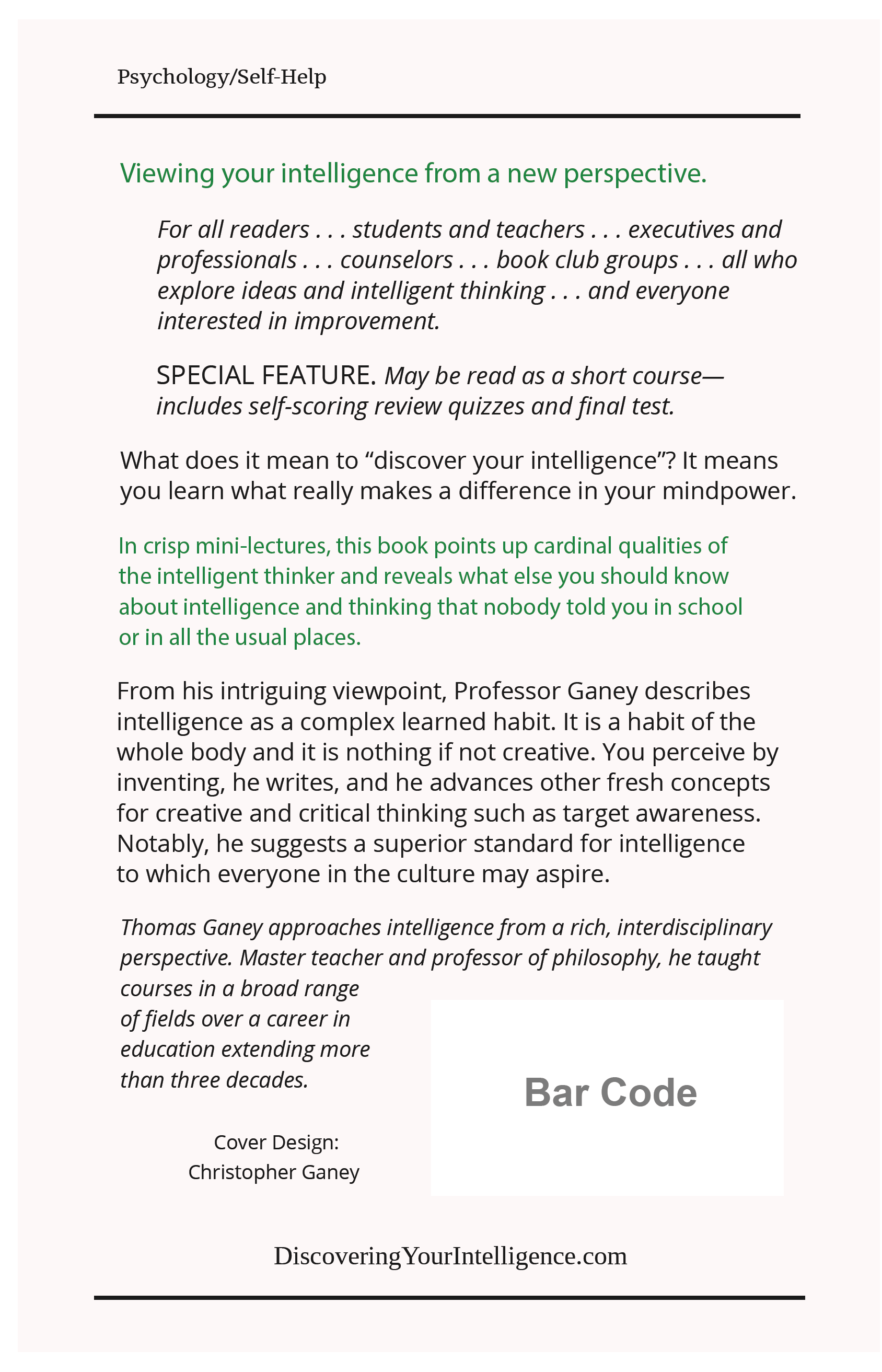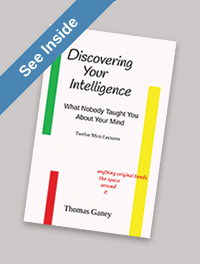Table of Contents
Preface: BeticalAlpha
CONVERSATION WITH THE AUTHOR AND
TOPICS FOR THOUGHT AND DISCUSSION
- Intelligence is an expression of will.
- The mind is a mystery to itself.
- The body is an extension of the mind.
- Quick thinking never made a profound theory.
- Some people would rather be told they are ugly than be told they are wrong.
- Logical thinking is not altogether a matter of intellect because it is a test of character.
- Within the halls of many schools, an implicit goal of instruction is to produce something resembling the answer-smart brain.
- If you are an intelligent person, you will show yourself capable of reversible thinking by which the mind folds back on itself.
- With discipline and ready strategies, you can excite the recessed, secretive sources of your consciousness.
Sample Chapter
Lecture Nine
A Mind That Folds Back on Itself
Some proverbs are so common as to be uninteresting yet lose their blandness when you start thinking about them. I have one in mind that you know very well: A rolling stone gathers no moss. What does it mean? Is it saying that it’s good to be a rolling stone? Many people would answer yes. A rolling stone is someone who moves through life without accumulating the possessions and responsibilities and ties that limit freedom. Is that your take?
Maybe you decide by a different reading that it’s bad to be a rolling stone. This person rolls through life freely but without development and without the attachments that bring most people fulfillment, remaining a stone and merely a stone. With the second meaning as compared to the first, you note a reversal: the proverb doubles back on itself. Both meanings are there, representing something of the complexity of reality, how it has more than one side and has a way of turning back on itself, exactly as the proverb does.
William Shakespeare captured this aspect of reality, his vision being universal—not taking sides but representing all sides. He conveyed the complexity of reality by many means, including his figures of speech, to have you know that everything is something else. “Fair is foul, and foul is fair,” he memorably wrote in the opening scene of Macbeth. It could be read as a proverb, could it not? And note, once more, a reversal; this is what I really want you to take forward in the discussion. For if you are an intelligent person, you will show yourself capable of this reversible thinking by which the mind folds back on itself—so that, for example, you will be thinking (as you invent in order to perceive) that perhaps, just perhaps, vanity succeeds better in life than modesty or, again, the worst error in life is to strive for perfection. Foul is fair, fair is foul; you make the foreign familiar, the familiar foreign. In this manner, widely in your experience, you may exercise the cardinal power of objectivity, opening your awareness to all sides of a question in advance of making a judgment. This is critical thinking, obviously, but it is also creative, and it necessitates an effort of will which makes for control.
====================
Think of a reversible figure-ground drawing. The vase/two faces is a common example. You see the vase, and in a small act of will you switch your perspective and you see the faces in the drawing instead of the vase. Your perception is complete in recognizing both the vase and the faces, though you do not see both simultaneously.
====================
Putting a name on this, I am talking about reframing. To be objective—to be critical, to be creative—is to be adept at reframing. Studying an epidemic, the researcher stops asking why the sick got sick and begins asking why others did not. It’s BeticalAlpha: turn it around. A scientist perfects his theory not by confirming it with ever more data but instead, in a reversal, by creatively attempting to disconfirm it, aggressively seeking to falsify it along any and every avenue. He enacts a special discipline.
Reframing becomes a necessary corrective to one’s thinking, very much so because the human intellect is not naturally objective: it will not oppose itself to see all sides. What is, is—the mind will commonly proceed with things as they seem without violating the familiar, all the while denying the foreign or peculiar that might open it to discovery or the truth complex and whole. It may, indeed, proceed along a line to the end of the line, sponsoring a belief “to the damndest degree.” It is generally comfortable with absolutes. Writers, for instance, occasionally reveal a fondness for absolutes in their expressions as in this statement by Thomas Carlyle: “Work is the grand cure of all the maladies and miseries that ever beset mankind.” (A perceptive reader will open the question to alternatives.)
The mind, wanting an absolute, thinks polar . . . either this or that, not both. I remember a letter someone wrote to a popular magazine, a reader reacting to an article on prisons. The purpose of incarceration, he declared, is not to punish anybody and is not to rehabilitate anybody; the only purpose is to lock up the offender to protect the public. So much for the truth complex and whole. This is the mind that does not fold back on itself. It is illogical because it lacks objectivity, being intent on taking sides. There is more to this, as there always is, but I am anticipating my next lecture, which has to do with logic.
End of Sample Chapter
Back Cover of the Book


thomas@discoveringyourintelligence.com